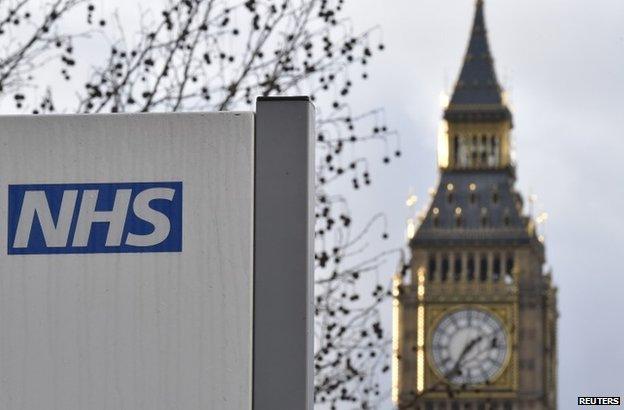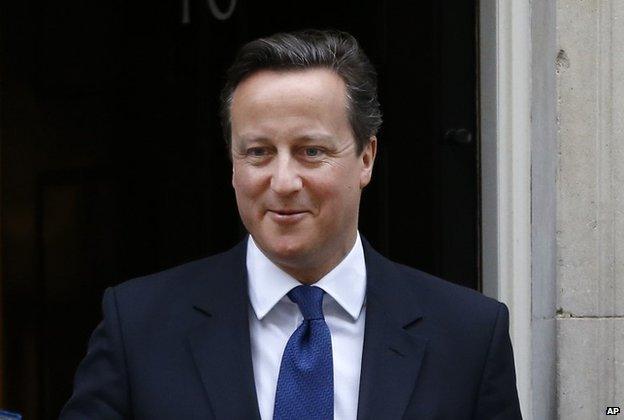Time to talk money
- Published
Extended extracts: Nicola Sturgeon interview with Nick Robinson
Let us talk money. The sums contained within the draft Scottish budget, external.
And the sundry sums which are diverted to Scotland, via the Barnett Formula, as a consequence of expenditure in England.
The latter features in an interview with the first minister, conducted by my estimable colleague Nick Robinson.
Nicola Sturgeon speculates upon the events which might provoke the SNP to break their self-denying ordinance and vote in the Commons on matters affecting England.
One such, she suggests, would be to "restore" the NHS in England in order to protect the Barnett-determined Scottish budget.
Salient issues
This, she says, would involve countering the trend towards privatisation which she detects south of the border with, she forecasts, an eventual reduction in public provision.
Two caveats first.
One, this argument replicates the case which the SNP made during the referendum - to the exasperation of opponents who said that the NHS was devolved and, consequently, not a salient issue during a discussion of the Union.
Two, the self-denying ordinance is not universal.
For example, in the past, SNP MPs have taken part in votes on the issues of foundation hospitals and university tuition fees even although there was no direct impact upon Scotland. So, strictly, the offer with regard to the NHS is not entirely novel.

Scotland's first minister raised the issue of SNP MP voting policy ahead of May's UK election
However, Ms Sturgeon knows very well what she is about. She is responding to two contemporary factors.
One, the prospect that the SNP might play a role in determining the colour of the next UK government.
Two, the question of English Votes on English Laws, or EVEL.
Ms Sturgeon has previously set out the price tag for any possible Westminster deal with Labour, including enhancing Holyrood powers still further, moderating austerity and scrapping the renewal of Trident.
(A deal with the Tories, incidentally, is strictly ruled out.)
Now she is attempting to outline the other side of the equation: what the SNP might bring to the table.
Hence, her talk of assisting what she calls progressive opinion in England with regard to the NHS.
Constitutional controversy
This is also designed, in part, to counter Labour's argument that any vote for the SNP is a little helper to the Tories.
Then EVEL. Only yesterday the Chancellor George Osborne suggested that it would be necessary in future to preclude Scottish MPs from voting on elements of the budget because it is now proposed that income tax rates and bands should be devolved to Holyrood, inasmuch as they affect Scotland.
Ms Sturgeon is deliberately engaging with the issue of voting rights at Westminster, in that context.
It may be said that her intervention will exasperate Conservatives and provoke further constitutional controversy. And that is a problem exactly how for the SNP?
Consider this.
It has sometimes been said by supporters of the Left in England that Scotland must be maintained within the Union to avoid permanent Tory governance south of the Border.

David Cameron's Conservatives feel obliged to lay emphasis upon English Votes for English Laws.
That always struck me as a curious argument: suggesting in effect that the Scots must be deployed in order to prevent the people of England from getting what they wanted.
As I have written previously, the continuing State that is the UK studiously avoided the West Lothian question for the most part.
Too tricky, too awkward, too many consequences, both seen and unseen.
Now, for entirely understandable political reasons (known as UKIP), the Conservatives feel obliged to lay emphasis upon English Votes for English Laws.
With her intervention today, albeit a restatement of previous tactics, Ms Sturgeon is stirring the EVEL pot.
Devolving taxation
The issue which might arise - if this turns into reality, after May - is as it has always been: one of definition.
Is it possible, precisely, to define issues at Westminster which are solely and singularly English in impact?
Would it thereby be possible to preclude, via statute, Scottish interventions in those issues in the Commons?
Or is Nicola Sturgeon right: is there very frequently a Scottish backwash from Westminster decisions affecting England?
In response to the Chancellor's comments, the SNP said that it would be necessary to devolve the totality of taxation for the George Osborne scenario to prevail.
This has a way to go.

Budget matters

To the Scottish Budget, then. John Swinney has ironed out his planned property tax which will replace Stamp Duty in Scotland from April.
This was partly in response to Tory prompting but largely in response to cuts in stamp duty announced by the Chancellor.
If he had not acted, the relative disadvantage experienced by Scots would have been greater than he planned.
Under the revised scheme, he said, 90% of house purchasers in Scotland would still be better off or no worse off. It was, he suggested, a good deal.
For the Tories, Gavin Brown smiled gently.
He welcomed the changes - while suggesting, again gently, that there might still be further scope to prevent impositions upon higher value houses affecting the market more generally.